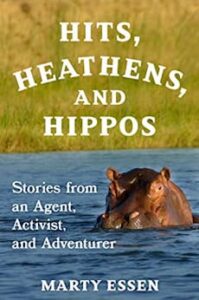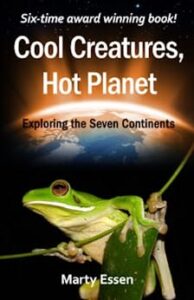Doctor Refurb received a 4+ star review, making it an IndieReader Approved title.
Following find an interview with author Marty Essen.
What is the name of the book and when was it published?:
Doctor Refurb. Published September 18, 2022, to coincide with Banned Books Week.
What’s the book’s first line?
I didn’t think the voice whispering in my head was real at first.
What’s the book about? Give us the “pitch”.
What if you could reach back in time to deport the world’s worst environmental villains to a depository planet before their greed condemns Earth to an ecological apocalypse? What if each time you did so, an alien extracted a body part and replaced it with a refurbished one? Would you still do it?
With little choice but to cooperate, Dr. Stefan Westin and Tara Kramer endure multiple body part extractions for the sake of Earth. Then, with the help of Rodney, a planetary consultant from another galaxy, they must finish the job by traveling back in time to capture Ralph, a rebellious alien who has been jumping from person-to-person doing evil in the name of Christianity since biblical times. But Ralph could be anywhere—from instigating the Salem witch hangings, to abusing indigenous children at residential schools in Canada, to occupying an abusive missionary in Brazil. Only by capturing Ralph can Stefan and Tara annul the unholy marriage between conservative Christianity and the worst environmental villains.
Heartrending yet hilarious, Doctor Refurb is influenced by actual historical events and confronts the serious subjects of climate change, far-right politics, and child abuse committed by Christian authorities.
What inspired you to write the book? A particular person? An event?
Whether I write nonfiction or fiction, all my books reflect my values of protecting human rights and the environment—and I try to project those values with a wry sense of humor. But even when I’m writing fiction, I draw on facts. Inspiration for Doctor Refurb began almost twenty years ago, when I explored a cave in Belize with an indigenous man. When we came across some old broken pottery, deep inside the cave, he explained to me that this was where his people hid to escape Christian missionaries and practice their own religious beliefs. Later, I did more research into abusive missionaries, molesting priests, and the torture and murders of thousands of indigenous children in Canada’s Christian residential schools. With Doctor Refurb, I hope to give more exposure to such incidents and also tie it into the use of Christianity by the far-right to normalize the abuse of our environment. It all sounds depressing, I know, but Doctor Refurb is still a hilarious book, filled with madcap time-travel adventures.
What’s the main reason someone should really read this book?
I write primarily for a liberal audience. Doctor Refurb provides much-needed escapism during these trying political times, and because I use real facts in the novel, readers will learn something at the same time.
What’s the most distinctive thing about the main character? Who-real or fictional-would you say the character reminds you of?:
Dr. Stefan Westin (Doctor Refurb) is a big-hearted man who really cares about people, yet he’s not afraid to get down and dirty when he needs to. He’d probably fit in just fine as the ship’s doctor on any of the many Star Trek series.
When did you first decide to become an author?
In 2001, after traveling to the Amazon Rainforest and Australia, I wrote stories about my adventures that were picked up as features by two newspapers. Once those stories ran, whenever I would go out in public, people would recognize me from the author photo and tell me how much they enjoyed what I wrote. Schools also invited me to come and speak about my adventures. At that point, I started thinking, “What if my wife and I traveled to all seven continents, and I wrote a book about it?” I did some research and learned that at that moment fewer than one hundred thousand people in the history of the world had ever stepped onto Antarctica. That meant that far fewer than one hundred thousand had traveled to all seven continents. Next, I looked for books written by people who had traveled to all the continents. When I found a couple of those, I narrowed the subject to travel to every continent in search of rare and interesting wildlife. There was nothing. That gave me the topic for my first book, Cool Creatures, Hot Planet: Exploring the Seven Continents.
Is this the first book you’ve written?
I have written three nonfiction and four fiction books, so Doctor Refurb is my seventh.
What do you do for work when you’re not writing?
I’m a college speaker that performs the stage-show version of my first book. I have been speaking at colleges for 16 years and have performed on hundreds of campuses in 45 states. I’m also a talent agent, who started in the music business and now books other nationally known college speakers.
How much time do you generally spend on your writing?
There is a story in my sixth book, Hits, Heathens, and Hippos, about me writing my first book, sixteen-hours-a-day, and staying alert by swallowing caffeine pills with my coffee. That schedule eventually sent me to the hospital emergency room, with blood-pressure at near-stroke levels. I have since moderated my work schedule, but when I’m “in the zone” I will still write up to 12 hours a day.

The best part is being able to call my own shots and to react quickly when new opportunities arise. The hardest part is not getting the same respect that indie filmmakers or indie bands get. I work with professional book designers and editors and put out a product that is better than much of what the major publishers produce. Even so, I still have to deal with publications and reviewers who are bigoted against what I do, because I didn’t get “corporate approval.”
What’s a great piece of advice that you can share with fellow indie authors?
Don’t put out crap—it hurts us all. Keep a copy of the Chicago Manual of Style next to you as you write, and make sure your book is professionally designed and professionally edited.
Would you go traditional if a publisher came calling? If so, why?
I have had opportunities to go with traditional publishers in the past, but each time it would have required me to sell-out by cutting photos, politics, or other content. I refuse to sell-out. Should a publisher come along that gave me more control and a decent promotional budget, of course I would consider them.
Is there something in particular that motivates you (fame? fortune?)
All seven of my books (three nonfiction and four fiction) have the liberal political theme of protecting the environment and human rights. I couldn’t write unless I felt I was doing my part to make the world a better place—and encouraging others to do so as well.
Which writer, living or dead, do you most admire?:
For fiction, it’s Audrey Niffenegger. The Time Traveler’s Wife was brilliant. I especially enjoyed how she integrated music into her story, creating a virtual soundtrack. That’s something I try to do in my books too.
For nonfiction, it’s Bill Bryson. His adept use of self-depreciating humor makes even mundane situations funny.
Which book do you wish you could have written?
The Bible, because I’d make it shorter, more accurate, and much less subject to misinterpretation by people who use it to support their prejudices and justify their mistreatment of others.


